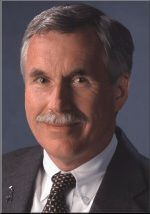Article
2012 APA - IPS: Is it Time for a Fifth Cycle of Reform in Mental Health Care?
Author(s):
Mental health expert says that the key to improving care is to integrate medical care into mental health settings, and introduce mental health care competence into primary care.

New York, NY — In a densely packed lecture hall at the American Psychiatric Association 64th Institute on Psychiatric Services, Michael Hogan, PhD, Commissioner of Mental Health for New York State, discussed the history of reforms in mental health, identified current needs, and looked to the future.
Reflecting on previous eras of mental health reform since the 1900s—Moral treatment, Mental hygiene, Community mental health, and Community support for people with serious mental illness—Hogan remarked that these were all acute care models. He said that the core clinical idea for this new era is integration, which he said can be thought of as encompassing all facets of care “from the clinical level to the policy level, on the front lines and in health plans.”
The first dimension of integration is to insure that medical care is integrated into mental health care for people with serious mental illness. “In mental health, we tend to deal with our patients as if they exist from the neck up… Despite poor health, people with serious mental illness have poor utilization of medical services… Comorbid medical conditions are not detected and treated in mental health settings just as depression and anxiety are not routinely treated in the primary care setting,” he said. One goal of the fifth cycle is to integrate medical care into mental health settings, and introduce mental health care competence into primary care.
After speaking at length about models of collaborative care and a variety of specialty health plans and payment models to achieve them, Hogan described the typical 30+ year trajectory of serious mental illness as a sequence characterized by first onset, hospitalization, symptom relief, relapse, rehospitalization, and finally adjustment to living with psychiatric disability.
In contrast, he advocated the idea of First Episode Care (FEC), which he described as a highly effective, long overdue innovation centered on early intervention. In this model, young people newly diagnosed with psychosis are prescribed medicine that offers the best mix of symptom relief and side effects, provided with the necessary guidance and counseling to help them adhere to their treatment plan, provided with a proactive model to maintain their social functioning, and helped to maintain a sense of normalcy in their lives.
Citing the work and influence of international researcher and clinician Patrick McGorry in Australia—who is known as “the father of FEC”—Hogan disclosed that New York State is in the process of getting an FEC system up and running. In the next few months there will be five or six clinics across New York State that are built on this model, which he hopes to replicate statewide.





